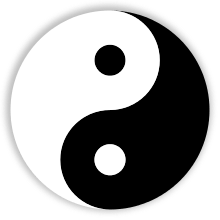Strengths and weaknesses (personality)

Taoist pictorial representation of dark and light
Strengths and weaknesses generally refer to a person's character.
Often a strength can be a weakness, and vice versa, a weakness can be a strength. In Chinese philosophy, yin and yang (e.g., dark and light) are described as complementary opposites within a greater whole.
For example, here are some strengths and weaknesses by personality type.[1][2]
| Personality Type | Strength | Weakness |
|---|---|---|
| Analytical (Get It Right) | Thinking | Excludes feelings from decisions |
| Thorough | Goes too far; perfectionist | |
| Disciplined | Too rigid or demanding of self/others | |
| Driver (Get It Done) | Independent | Has trouble operating with others |
| Decisive | Does not take time to consider other perspectives | |
| Determined | Domineering; too focused on doing it "my way" | |
| Amiable (Get along) | Supportive | Tends to conform to wishes of others |
| Patient | No time boundaries; things do not get done | |
| Diplomatic | Not assertive or directive | |
| Expressive (Get appreciated) | Good communicator | Talks too much |
| Enthusiastic | Comes on too strong | |
| Imaginative | Dreamer; unrealistic |
References
- ↑ Peter Urs Bender's Guide to Strengths and Weaknesses of Personality Types
- ↑ Brinkman, Rick, and Rick Kirschner (2002). Dealing with People You Can't Stand: How to Bring Out the Best in People at Their Worst, 2nd ed. McGraw-Hill. ISBN 0-07-137944-4.
See also
This article is issued from Wikipedia - version of the 10/7/2014. The text is available under the Creative Commons Attribution/Share Alike but additional terms may apply for the media files.